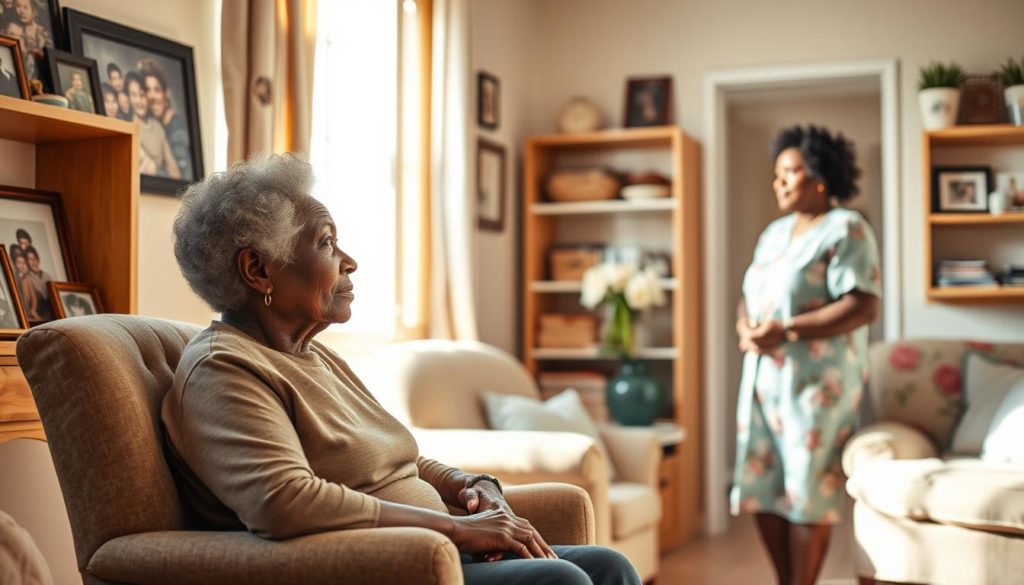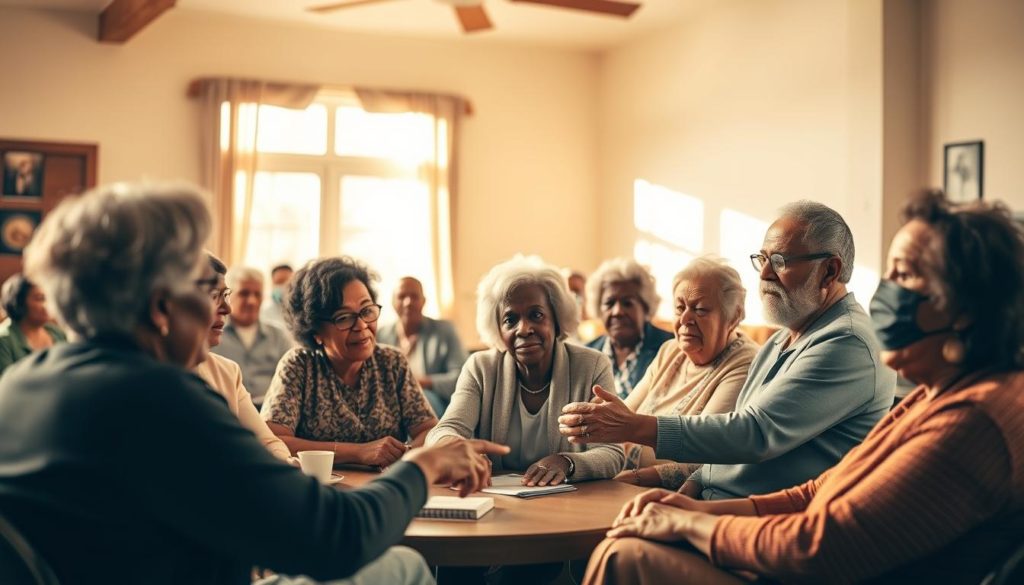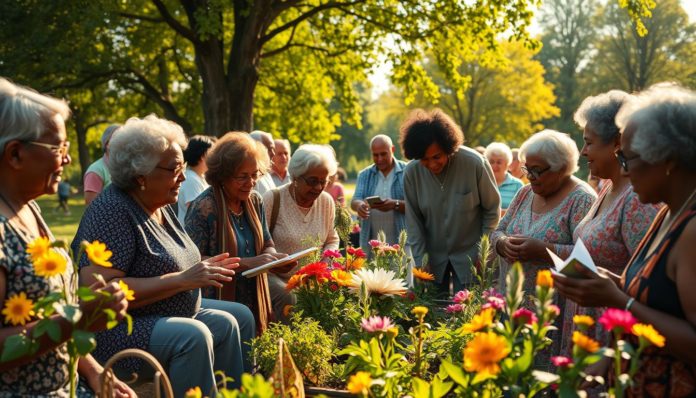Did you know Black Americans are twice as likely to get Alzheimer’s compared to white Americans? This fact highlights the unique struggles within the Black community regarding Alzheimer’s disease. We aim to shed light on the differences in diagnosis, treatment, and care that are influenced by socioeconomic and healthcare factors.
It’s crucial to offer healthcare that understands cultural needs. This improves Alzheimer’s outcomes for African Americans. We must develop Alzheimer’s care plans that meet the specific needs of Black elders and their families. Let’s look at these insights and care methodologies, aiming to better the lives of those impacted.
The Impact of Alzheimer’s Disease in Black Elders

Alzheimer’s disease hits Black elders hard, showing a big health gap in the U.S. We’re looking into how often it happens, why the risk is higher, and the high rates of death and illness it causes among African Americans.
Prevalence of Alzheimer’s Among Black Americans
Studies find that older Black people are almost two times more likely to get Alzheimer’s than White people. This high rate shows we need to tackle the health problems that Alzheimer’s brings to Black families. Knowing the big effect it has on Black elders can help start special programs.
Reasons for Higher Risk Among Black Elders
Many linked reasons lead to higher Alzheimer’s illness rates in African Americans. These include:
- Genetic predispositions
- Socioeconomic disadvantages
- Higher rates of chronic health conditions like hypertension and diabetes
- Lower access to comprehensive healthcare services
To lessen the health gaps for Black elders, it’s important to look at all these factors.
Mortality and Morbidity Rates
The facts on how Alzheimer’s affects African Americans are worrying. Deaths are more common and the illness often gets worse faster among Black elders. This shows the huge need for health care plans that focus on lowering these gaps.
| Factors | Impact |
|---|---|
| Prevalence | Twice as likely among Black elders |
| Risk Factors | Genetic, socioeconomic, chronic health conditions |
| Mortality Rates | Higher in Black elder population |
Understanding Alzheimer’s Disparities in African Americans

Alzheimer’s affects African Americans differently due to many factors. These include social and economic issues. It’s critical to create special programs and study these causes closely.
Socioeconomic Factors
African Americans facing Alzheimer’s also battle socioeconomic challenges. Lower education and higher poverty rates play a big part. Environmental stresses make it harder too.
These problems don’t just increase risk. They also make getting healthcare tough. This shows why we must look into these issues more.
Access to Healthcare Services
Getting healthcare is hard for many African American elders. They often face delays in getting diagnosed and treated for Alzheimer’s. It’s important to fix these healthcare gaps and consider how social and economic factors affect health.
Improving healthcare and looking at what causes these differences can help. It could lead to better health for African Americans with Alzheimer’s.
Alzheimer’s Awareness in the Black Community
It’s crucial to raise Alzheimer’s awareness in the Black community. This helps with early detection and managing the disease better. Cultural misunderstandings and stigma around dementia often cause delays in seeking help. This harms patient health. By tackling these problems, we can boost minority health awareness and understand Alzheimer’s better.
We need effective healthcare initiatives to overcome cultural barriers. These can include:
- Community workshops providing education on Alzheimer’s symptoms and management
- Outreach programs that offer support and resources to Black families affected by the disease
- Collaborations with local organizations to spread key information on minority health awareness
- Efforts to lessen the stigma of dementia with culturally relevant educational materials
The role of churches and community centers is vital. They can host sessions and support groups. This offers a comfortable place for talks on Alzheimer’s and what it brings. This approach makes sure the message reaches different people in the Black community.
Moreover, focused media campaigns on Alzheimer’s awareness can change how people see the disease. It encourages them to get help soon. Healthcare efforts must match the cultural background of the Black community to succeed.
Challenges Faced by Black Families in Alzheimer’s Care
Black families caring for someone with Alzheimer’s face many hardships. They often deal with stress and financial problems. Caring for a loved one is hard and emotionally draining. This can lead to burnout and health issues.
Also, managing Alzheimer’s care at home is expensive. It puts a lot of pressure on a family’s budget.
Caregiver Stress and Burnout
Caregivers for Alzheimer’s patients are under a lot of stress every day. Their role needs constant vigilance and patience. This often results in mental and physical health issues.
It’s very important for caregivers to get the right support. This helps them handle their duties and lowers the chance of burnout.
Financial Strain and Resources
Dealing with Alzheimer’s at home is financially challenging. The costs for medical care, specialized services, and meds are high. Families work hard to find financial aid while trying to give the best care.
| Challenge | Impact | Possible Solutions |
|---|---|---|
| Caregiver Stress | Emotional and physical burnout | Respite care, support groups |
| Financial Strain | High medical and care costs | Government assistance, charitable programs |
Alzheimer’s Support for Black Caregivers
Caring for someone with Alzheimer’s is hard. It’s even tougher for Black caregivers who often face unique problems. Many resources and programs exist to help and support them.
Community and Government Programs
Many community programs and government efforts aim to help Black caregivers. They offer respite care, which gives caregivers a break. Financial help is also available to lessen the care costs.
- Respite care services: Offers temporary relief to primary caregivers.
- Financial assistance: Provides monetary support to manage care costs.
- Training programs: Equips caregivers with the skills needed to manage Alzheimer’s care effectively.
Importance of Support Groups
Support groups are crucial for emotional and hands-on help. They let caregivers share stories, learn, and find comfort with others in the same boat. This exchange of tips is key for coping with Alzheimer’s.
- Emotional support: Offering a safe space to express feelings and frustrations.
- Educational resources: Sharing up-to-date information about Alzheimer’s disease and care strategies.
- Networking opportunities: Connecting with other caregivers to build a supportive community.
By using Alzheimer’s programs and joining support groups, Black caregivers can find the help and community they need. This support makes the care journey for a loved one with Alzheimer’s a bit easier.
| Resource | Benefit |
|---|---|
| Respite Care Services | Temporary relief and rest for primary caregivers. |
| Financial Assistance | Monetary support to manage care costs. |
| Training Programs | Skills and knowledge for effective caregiving. |
| Caregiver Support Groups | Emotional support, educational resources, and networking opportunities. |
Barriers to Alzheimer’s Diagnosis in African Americans
Getting the right Alzheimer’s diagnosis in African American communities faces many hurdles. It’s key to understand these obstacles to improve healthcare and outcomes.
Underrepresentation in Clinical Trials
African Americans often aren’t included enough in clinical trials. This means research doesn’t fully capture the effects of genetics and environment on them. Such lack of representation hinders the creation of effective diagnostic tools and care solutions.
Bias in Diagnostic Tools and Procedures
Racial bias in healthcare affects diagnostic accuracy too. Many diagnostic methods are not designed with African Americans in mind. As a result, there’s a higher risk they might be misdiagnosed or have their diagnosis delayed.
| Barriers | Impact on Diagnosis |
|---|---|
| Underrepresentation in Clinical Trials | Limited understanding of disease impact, ineffective care |
| Bias in Diagnostic Tools | Misdiagnosis, delayed diagnosis |
To ensure equal healthcare, addressing these barriers is crucial. Enhancing clinical trial diversity and facing healthcare biases can lead to better and timelier Alzheimer’s diagnoses for African Americans.
Innovative Care Strategies for Alzheimer’s in the Black Community
Alzheimer’s care in the Black community needs unique approaches. These should tackle cultural, social, and economic challenges. There are community programs, new tech, and health initiatives aimed at better dementia care.
Culturally tailored programs are essential. They greatly improve care for Black elders. Memory cafes and support groups are especially helpful for patients and their families.
New tech is vital in Alzheimer’s care. Mobile apps monitor cognitive health, while virtual reality helps with cognitive stimulation. Telehealth services offer care that families can easily access from home.
Community involvement is key to dementia care. Churches, community centers, and non-profits provide vital resources. They focus on education, awareness, and support for patients and caregivers.
Using these Alzheimer’s care strategies can greatly improve life quality. They blend cultural understanding, tech, and community support. This approach effectively tackles Alzheimer’s in the Black community.
Risk Factors for Alzheimer’s in Black Individuals
Understanding Alzheimer’s risk factors in Black people is key. It helps in early detection and better control of the disease. This group is seen to be more at risk due to various factors.
Genetic Predispositions
One major genetic risk for Alzheimer’s is changes in the ApoE gene. These changes mean a higher chance of getting Alzheimer’s in Black populations. Studies say genetics matter, but they’re not everything. Lifestyle and the environment also play big roles.
Lifestyle and Chronic Health Conditions
Common problems in the Black community are diabetes and high blood pressure. They raise the risk of Alzheimer’s. They can speed up memory loss and make the disease more likely. Lifestyle choices and not enough healthcare also add to the risks.
Dealing with these Alzheimer’s risk factors in Black folks needs effort from everyone. Promoting healthy living and controlling chronic diseases can help. Healthcare providers aim to lower Alzheimer’s rates in at-risk groups by addressing these issues.
Preventive Measures for Alzheimer’s in the Black Community
New research shows how important it is to prevent Alzheimer’s, especially for Black Americans. An effective way is improving heart health with exercise and a good diet. This helps overall health and lowers dementia risk.
Keeping diabetes under control is key too. High blood sugar can harm brain function. So, managing diabetes well is critical. Also, teaching the community about choices that keep the brain healthy is crucial. It’s good to stay mentally active, keep up friendships, and eat healthily.
Getting early checks for brain health helps catch problems early. This can slow down symptom progression. Here’s a summary of the top preventive steps:
- Promoting cardiovascular health
- Ensuring proper diabetes management
- Educating on healthy lifestyle choices
- Providing early cognitive health screenings
The Role of Education in Fighting Alzheimer’s in the Black Community
Education is a powerful tool in the fight against Alzheimer’s in the Black community. It boosts knowledge and awareness, helping to prevent the disease from getting worse. This way, we can be ready to tackle Alzheimer’s head-on.
Early Awareness Campaigns
It’s very important to know about dementia early on. This lets us diagnose and help sooner, improving results. Early awareness campaigns are key. They tell people what to look out for and to get help early. Good public health plans greatly improve how we see and accept Alzheimer’s education in the Black community.
Importance of Culturally Competent Education
Culturally aware healthcare is crucial. It ensures education is clear and respected in the Black community. By making education fit the community’s culture, we can close the gap between doctors and the community. This builds trust and makes it more likely for people to use healthcare well.
This kind of education leads to better health and supports the community better.
The Need for Culturally Sensitive Alzheimer’s Interventions
Addressing Alzheimer’s in the Black community needs special healthcare methods. Traditional healthcare often overlooks cultural differences. This can lead to less effective care. Culturally sensitive healthcare is key. It makes sure treatments consider the Black community’s unique culture and beliefs.
We must make dementia care better by using inclusive policies. These should speak to all people, especially minorities. Understanding the hurdles African Americans face helps create stronger support systems. This way, healthcare providers can offer care that really helps Black families with Alzheimer’s. It’s about making health care fair for all.
Also, it’s important to have diverse healthcare teams. This helps build trust with Black patients. When the healthcare staff looks like the community they serve, fitting care is easier to give. Research backs this up, saying diversity in healthcare teams helps fight care gaps in dementia. This can make a big difference.
FAQ
What are the primary reasons for the higher prevalence of Alzheimer’s among Black Americans?
The main reasons include genetic factors, socioeconomic issues, and health conditions. Limited access to healthcare also plays a big role.
How does socioeconomic status impact Alzheimer’s disease in the Black community?
Socioeconomic status affects it significantly. Lower education and higher poverty contribute to the health gap. This results in more Alzheimer’s cases in the community.
What are the specific barriers to healthcare access for Black elders with Alzheimer’s?
Black elders struggle with finding culturally aware doctors and face high costs. They also encounter biases, which hinder proper Alzheimer’s care.
Why is raising Alzheimer’s awareness in the Black community important?
Raising awareness helps in early detection and disease management. It also fights stigma, leading to better health outcomes.
What challenges do Black families face when caring for loved ones with Alzheimer’s?
Caring for someone with Alzheimer’s stresses Black families. They face both financial problems and a lack of support resources.
What types of support exist for Black caregivers of Alzheimer’s patients?
Support includes respite care, financial help, and caregiver training. Emotional support and advice come from support groups too.
What are the major barriers to accurate Alzheimer’s diagnosis in African Americans?
The big hurdles are fewer clinical trial participants and biased diagnostic methods. These often result in wrong or late diagnoses.
What innovative care strategies are being developed for Alzheimer’s in the Black community?
There are culturally adapted programs, new tech for cognitive health, and community efforts. These aim to enhance care and support.
What genetic factors increase Alzheimer’s risk in Black individuals?
Gene variations, diet, and lifestyles matter. So do common conditions like diabetes and high blood pressure, raising Alzheimer’s risk.
What preventive measures can reduce the incidence of Alzheimer’s in the Black community?
Preventive steps include boosting heart health and managing diabetes. Also, educating on brain health and early screening is beneficial.
How does education help in fighting Alzheimer’s in the Black community?
Education aids in early disease detection and action. It ensures health info and resources fit the community’s cultural needs.
Why are culturally sensitive interventions crucial for addressing Alzheimer’s in the Black community?
These interventions respect cultural beliefs and practices. They aim to cut healthcare gaps by making care and programs more inclusive.


